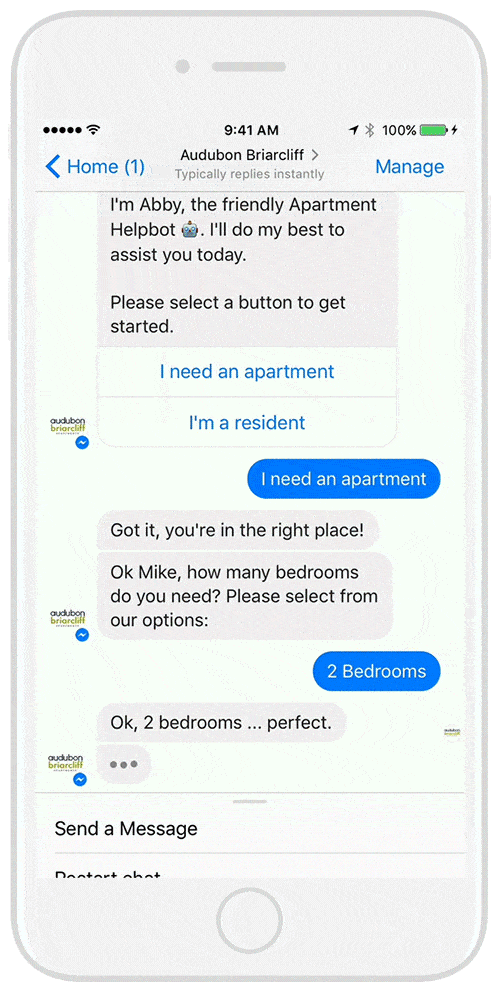How to Crush Multifamily Marketing in 2020
If you feel lost about where to start your marketing for your community, you are not the first and won’t be the last.
.jpg)
We don’t need to tell you that rental marketing has become increasingly complicated over the past decade - and we’re sorry to remind you that only a quarter of leads are actually sales-ready.
Luckily enough, however, with each new year comes advanced apartment marketing trends to work into your unique community.
Below we’ll discuss rental marketing ideas that will become impossible to ignore.
As weird as it may be, human interaction is slowly seeing itself out the door when it comes to the leasing process. Due to busy schedules, advancing technology, and people becoming more trustworthy of technology, online conversations are basically second nature to humans.
| Related: How to Put Leasing Agents Back in Control of the Leasing Experience
We have the tried and true channels of communication such as emails, websites, and social media. But there’s one tool that’s been cooking since the 1950s that has finally made a name for itself on the market - and is statistically proven to convert leads.
And that would be chatbots.
To put it simply, it’s easy to use as well as efficient. Gone are the days of waiting on hold for 20 minutes for customer support to pick up!
BotCore highlights some outstanding facts in a 2018 infographic. Not only will chatbots cut business costs by $8 billion come 2022, but 90 percent of modern BI platforms will have artificial intelligence as a standard feature by next year.
So what’s all the rave about?
Well, according to The 2018 State of Chatbots Report, people enjoy chatbots mostly because they:
The best part is that not only do renters prefer it, but businesses benefit from it just as much - if not more.
With artificial intelligence making its name known, chatbots are just one example of smart-technology controlling the renting market today.

AI may sound a bit intimidating - especially for individuals in the real estate industry. However, it’s not here to steal any jobs.
In fact, according to g2.com,
Overall, it’s here to help not only the renter, but your business as a whole.
Here we will discuss what types of AI real estate businesses can effectively market to modern day renters.
According to Pew Research Center, a 2017 report states that 90 percent of American households contain at least one device capable of streaming information.
Not necessarily a new adaption, but one that is quickly winning over renters everywhere.
Also known as The Internet of Things (or IoT), these features can handle a lot. They come in a few different forms, but a popular one right now is a “wearable,” such as an iWatch or Fitbit.
What it does, essentially, is stream different devices in order to control features throughout the home - like lighting and temperature - all in one easy to use place. You may have seen millennials controlling their apartment lights with their smartphones, even when not at home.
With an overwhelmingly large amount of renters opting to rent an apartment specifically because of electronic access features, if your community can afford this technology, it is sure to pay off in the long run.
But for those that can’t squeeze smart home features into their budget, AI features like lead intelligence software may be a better fit. These types of software, like Lusha and Datanyze, basically find good leads and the best way to reach them specifically for sales and marketing purposes.
A great tool to have for obvious reasons, they lead intelligence software can get pricey. Here’s a guide to everything lead intelligence, complete with the highest rated and easiest to use software on the market.
At the end of the day, companies using AI for sales were able to increase their leads by more than 50 percent, says g2.com - so it’ll definitely be worth working it into your marketing budget for 2020 no matter which AI feature you go with.
.jpg?width=6720&name=bence-boros-anapPhJFRhM-unsplash%20(1).jpg)
Listen, we’ve all done that thing where we find a song we like that we don’t know the name of, so we plug one main lyric into Google and wait for it to work its magic.
Well, apartment searching isn’t so different from that.
Whether prospective renters have an image as the only reference to where or what the community is, or have a specific amenity in mind they’re searching for, this initial search can be the most important part of converting a lead.
So how do multifamily marketers incorporate this into their strategy?
To clarify, visual search tools like Google Lens and Pinterest’s Lens allow individuals to plug in a picture they’ve discovered, and the software will provide the location as well as contact information for a property.
Since more and more search tools like these are popping up, rental marketing has the ability to utilize visual content to reach a wider range of potential renters.
For those that don’t yet have it, or would like to know what content would work best, here’s a list of digital content that has proven to boost interest immensely:
Although often times these digital tools are either embedded to a website or provide direct links to one, if you’re consistently posting valuable content on social media platforms, there will be a better chance of interested renters finding your information through various channels.
And the best part is that immersive content like virtual tours and video walk-throughs not only register positively with Google’s algorithm -unlike FaceTime tours that can't live online- case studies have shown just how effective they are in boosting engagement and interest.
.png?width=1200&name=02%20CC%20(1).png)
So posting visual content on platforms like Instagram, Twitter, Pinterest, Facebook, and so on, will be linked back to your domain, and increase your visibility. If you don’t have the content, however, click here for more information.
If you’re still not convinced, we’ll leave you with this fact: content marketing costs 62 percent less than outbound marketing, and generates 3 times as many leads.
Your call!
In an article written by the Digital Marketing Institute, research predicts that 50 percent of searches will be conducted through voice technology, while 30 percent will be screenless browsing by 2020.
Closing that statement, they note that businesses that want to remain visible to consumers in the coming years will have to find a way to incorporate voice technology into their digital marketing strategies.
And this includes rental marketing.
A good way for real estate businesses to incorporate voice search technology to their websites is by integrating voice properties to the digital content experience. Whether it’s a virtual tour or virtual reality, providing a voice as a “tour guide” can be an excellent way to give consumers a personalized experience.
For companies like LCP360, virtual hosting is a marketing tool that allows leasing agents to take prospects on a tour with voice capabilities. Apartment communities can utilize this same concept with automated voice technology to allow the same thing, but without having to schedule a tour.
In addition, voice search technology does amazing things for SEO - this is due to the way in which individuals interact with voice queries.
“All-encompassing,” or the technical term, omni-channel marketing, will either make or break a company come 2020.
Many of us recognize the concept of using multiple channels for marketing purposes. Well, this takes it one step further. Omni-channel marketing is essentially taking a single concept -or piece of content- and stretching it out across multiple platforms.
According to Single Grain, this is effective because it doesn’t overload internet users with different information. It takes important and valuable assets and uses them in many different ways.
For example, a company that has an excellent testimonial on their website quotes that person on a blog post, then posts the quote on Twitter with a link to one of the services it describes.
This gets the essential points across while registering as valuable content. Single Grain elaborates on all the benefits of omni-channel marketing in their article, here.
As we mentioned, some marketing tactics will always be there to fall back on, but advanced technology has consistently proven to push results - especially for rental marketing. And with marketing showing rapid progress in all sectors, businesses are tasked with keeping up with modern trends.
Between forming relationships, building trust, and catering to the modern renters needs, immersive technology is the voice of 2020. Whatever your budget may be, there’s something out there for everyone, so do your research and get those quotes if you plan to stay afloat come the new year.
For more information on immersive technology, click here.
/LCPMedia.com/Page%20-%20Resources/The%20TourBuilder%20Platform%20by%20LCP%20Media%20Thumbnail.png)
If you feel lost about where to start your marketing for your community, you are not the first and won’t be the last.

We often cover the “how” and “why” of apartment renting tactics for consumers, but now we’re here to talk about the what.

Did you know that in preparation for last year's fall semester, the student housing market was 59.5% pre-leased in March 2019?